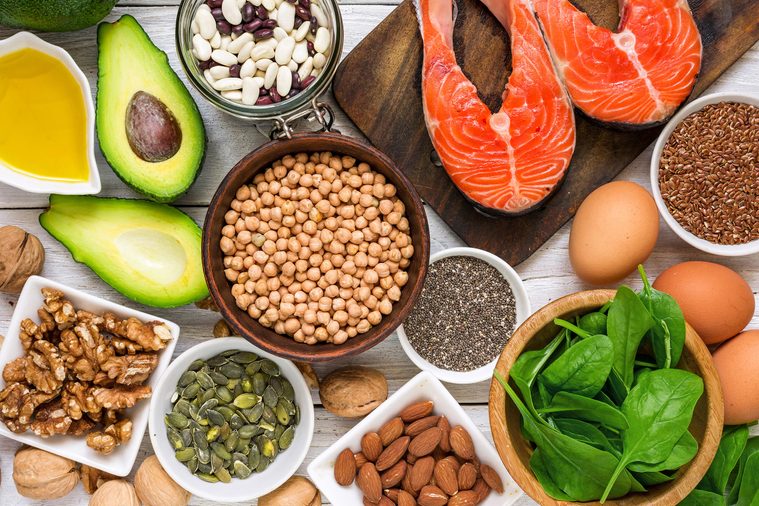
You aren’t eating enough calories
Wait, isn’t the point of a diet that you are supposed to cut calories? Yes, but according to registered dietitian and author of Belly Fat for Dummies Erin Palinski-Wade, RD, CDE, it’s only one piece of the puzzle. “A calorie is not just a calorie,” she says. “Depending on what you consume, calories from nutrients such as protein and unsaturated fat keep you full for an extended period, whereas calories from simple sugars digest rapidly.” If you’re cutting calories but not getting the proper vitamins, protein, and fiber you need, your weight loss plan is not going to work. According to a study from Japan, calorie restriction leads to slower metabolic rate, which means without enough calories, your body goes into survival mode, slowing down your metabolism to conserve energy and prevent weight loss. “Focus on improving the nutritional quality of your diet rather than your calorie intake for improved body weight and health,” Palinski-Wade says. Intrigued? These are the other weight loss tips doctors wish you’d stop following.
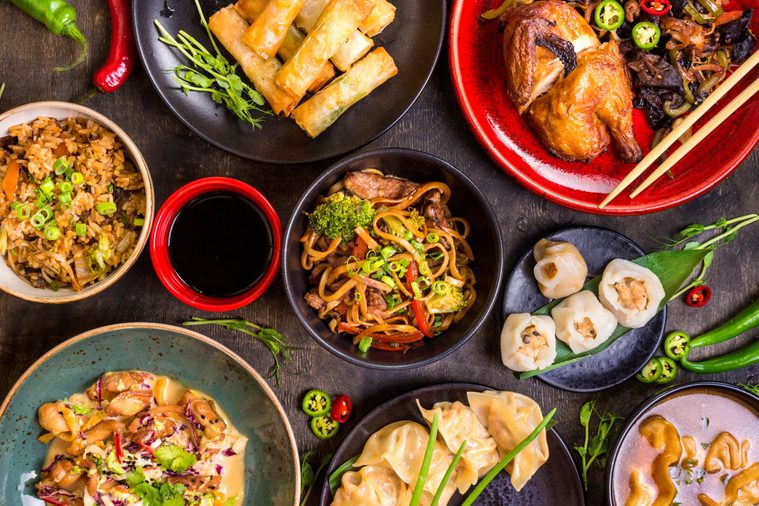
You’re skipping meals
As with cutting calories, skipping meals isn’t effective for healthy weight loss. Ignoring hunger cues throws off the signaling in your body, as Laura Moore, RD, director of the dietetic internship program at The University of Texas Health Science Center at Houston (UTHealth) School of Public Health, explains. “Energy intake, or what’s consumed, and expenditure, or what’s burned, is coordinated by signals from several systems, including the endocrine, adipose tissue, neurologic, and gastrointestinal systems,” she says. Chemical signals that increase and decrease appetite are sent to the brain. “This weight regulation system helps maintain a healthy weight for most people by modifying hunger, activity, and metabolism to keep the body weight within a target,” Moore says. “Moving below this target, or set point, by skipping meals can be challenging because the brain’s energy-balance system goes into action, pushing the weight back to its set point or even above.” That means you’re basically fighting with your body over where your weight should be. Instead, Moore recommends listening to your body’s signals, eating when you are hungry and stopping when you are full. Here’s what happens to your body when you skip breakfast.

You’re not mindful when you eat
So, if your goal is to eat less, how can you still satisfy your body’s hunger signals? The trick may be in changing how you eat as well as what you eat. Moore recommends tuning into your body through “mindful eating,” which means being acutely aware of everything you put into your mouth, how it tastes, smells, feels, and how it satisfies. “Take small bites of food and chew it slowly, stopping two or three times during a meal to determine if you are hungry or if you feel satisfied,” she says. If you get into the habit of mindful eating, you’ll be less likely to finish off those extra bites of mac and cheese from your kid’s plate. Another strategy is to change up your plate size—according to research from Cornell, subjects serving themselves food on larger plates dished out more, consumed more, and wasted more. Also, be mindful of other triggers that promote overeating, including noshing directly from the package, favoring buffet meals (more choices lead to higher food consumption), and succumbing to the temptations of ever-present food advertisements. Also, Moore says to eliminate distractions while eating. “Are you watching television, working through lunch, eating at your desk, or while driving in your car?” she asks. “It is important to disengage and focus on the meal, which will allow a person to experience hunger and satiety.” Here are 10 reasons why you keep overeating.
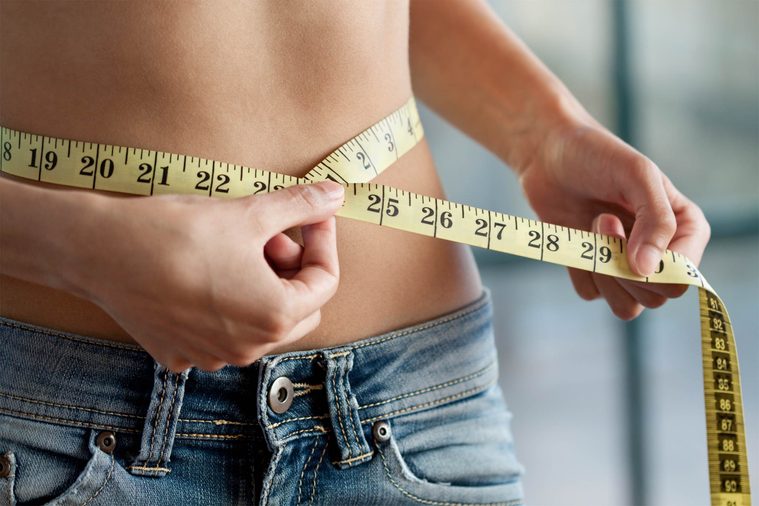
You’re on a fad diet
There are so many diets out there that claim to be the best way to lose weight—or even to be the healthiest way—and most require you to avoid whole food groups, as with Atkins and paleo. “Atkins, alkaline, blood type, Ornish-style, Weight Watchers, Paleo, Zone—all of these diets either restrict calories or specific macronutrient composition and for the most part lead to temporary weight loss because they’re not sustainable for the long-term,” Moore says. Studies have shown that sticking to a healthy number of calories is more important than which “macronutrients” (high protein, low carb, low fat) are eliminated or consumed. “Meals that contain lean protein, complex carbohydrates, fiber, and healthy fats offer longer satiety,” Moore says. “Nutrient-dense foods will provide the needed vitamin and minerals and will help maintain a feeling of fullness.” And this will help you stick to your goals long-term. Here’s more on why low-carb diets aren’t the answer.

You’re not planning ahead
It’s easy to think you’re going to eat healthy—until life gets in the way. “Families have busy schedules and it may be easier to pick up fast food or to snack on the run, but the portion sizes may lead to weight gain,” Moore says. If you can expect and plan for these situations, you can help avoid a diet fail. Cook large batches of meals when you have the time and freeze them for later so you don’t have to start from scratch every night. Fruit and veggie side dishes can also be frozen and pulled out for a quick meal or snack. Keep healthy snacks like nuts, apple slices with peanut butter, popcorn, or healthy granola bars on hand. And don’t toss those leftovers—use them. “Make chicken salad with Greek yogurt, nuts, and, fruit from that leftover roasted chicken,” Moore suggests. Mix in last night’s veggies with scrambled eggs, which can be cooked in seconds, for a healthy breakfast. Always keep a supply of beans, avocado, and hard-boiled eggs on hand for quick, satisfying lunches. “Beans or legumes make great plant-protein additions to salads, and hard-boiled eggs mixed with avocado make great egg salad sandwiches,” Moore says. These are the healthy snacks nutritionists always keep in their bags.

You’re not drinking enough water
The benefits of water work in several ways. First, water is good for the workings of your body. “The body is composed of 50 to 60 percent water, so it’s a necessary nutrient to maintain body fluids,” Moore says. It also helps fill you up, so you eat less. And drinking water is healthier than other liquids like juice or soda. “Water isn’t the key to weight loss, but it can substitute for sugar-sweetened beverages, which decreases calories,” Moore says. A recent study from the University of Illinois found that people who increased their water consumption by one to three cups reduced their caloric intake by 68 to 205 calories daily. They also lowered their consumption of saturated fat, sugar, sodium, and cholesterol. If you don’t like the taste of plain water, check out these 12 insane benefits of lemon water you never knew. Or, Moore suggests increasing intake of fruits and veggies that have a higher water content, such as watermelon, strawberries, grapefruit, cantaloupe, cucumber, lettuce, celery, radish, and tomato.

You’re not shopping smart
Along with meal planning, grocery shopping requires planning to support healthy eating. “When grocery shopping, always have a list,” Moore says. It will help you refrain from impulse buys. “A list will help you stay on a budget too,” she adds. Next, don’t hit up the store before you’ve eaten. “Shopping hungry is not a good idea because people tend to purchase more food and make unhealthy choices,” Moore says. A study from Cornell University found that people tended to buy more food, and specifically more unhealthy food, when they were hungry. While at the store, make sure you check out labels, because sometimes foods packaged as “healthy” are anything but. “Read labels on food in the ‘Nutrition Facts Box’ and focus on serving size, total calories, fat, protein, fiber, and sugar,” Moore says. But do take advantage of the store for some prepared foods that can help you stick to your goals for healthy meals. “If you don’t have time to roast chicken, purchase the rotisserie chicken from the grocery store,” Moore suggests. Before you do, make sure you read up on the secrets behind Costco’s $4.99 rotisserie chicken.

You’re not exercising
Eating right is only one aspect of achieving a healthy weight—you can’t downplay the importance of exercise. “If you have been adjusting your food intake without seeing the scale move, it may be because diet is just one part of the weight loss puzzle,” Palinski-Wade says. “If you are taking in fewer calories but also moving less, you will be burning fewer calories as well. That cancels out your overall calorie deficit, which leads to limited weight loss.” This is another reason why you shouldn’t cut calories too drastically: You need energy to exercise. Although studies have shown that increased exercise is not enough to achieve weight loss on its own, it’s still important for overall health, as well as for speeding up a slow metabolism. Just don’t use that trip to the gym as an excuse to chow down on unhealthy food later. Read more on the diet vs. exercise debate.
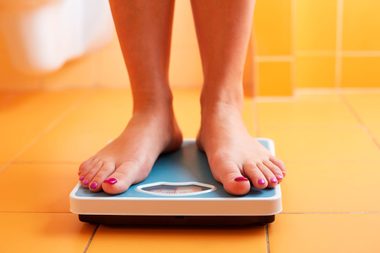
You’re paying too much attention to the scale
If you are exercising more, you may not see a change in actual weight—but that doesn’t mean you’re not getting leaner. “If you have recently taken up an exercise routine, especially one that involves weight training, you may be losing inches without seeing a change on the scale,” Palinski-Wade says. “This is due to muscle taking up less space than fat mass. If you lose a pound of fat and gain a pound of muscle, your weight will stay the same on the scale, yet you will have lost inches.” In addition, muscles burn more calories than fat, so an increase in muscle mass will help you lose even more. Here are 9 foods you need to eat to build more muscle. Finally, rather than fixate on a number on the scale, go by the way you look and feel—and how your clothes fit.
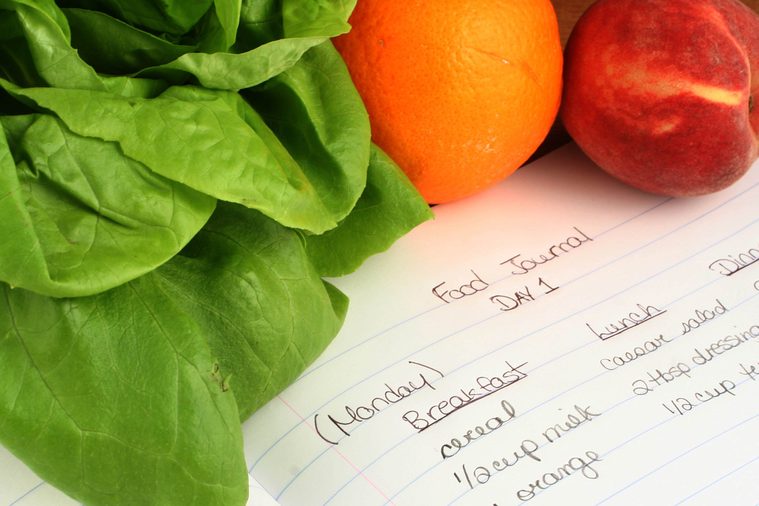
You’re too restrictive
In the same vein as avoiding fad diets that eliminate entire food groups, you don’t want to be too restrictive with what you allow yourself to eat. Restriction sets you up for failure, because it’s not sustainable in the long run. “Being too restrictive with your meal plan leads to burn out and often times binge eating,” Palinski-Wade says. “There’s a reason we say that diets don’t work, and it’s because of the mentality that a diet is something you will ‘go on’ only to ‘go off’ again in the future. Instead of ‘dieting,’ focus on making one or two small changes and build upon this over time to not just lose weight but to keep it off for life.” If you ease into it, and still allow yourself a treat every now and again, you’ll get used to the change gradually and will adapt better to healthy eating. “Bottom line: Long-term lifestyle changes are necessary to maintain a healthy weight,” Moore says. “This includes mindful eating, daily exercise, and portion control.” Read these inspiring stories of people who lost over 50 pounds—and kept if off.
You’re not considering your genetics
Scientists are learning there’s no one-size-fits-all diet plan, so what helps one person lose weight could actually make someone else gain weight. Trial and error is an option, but to get clearer answers on what will or won’t work for you, consider over-the-counter genetic testing. “Although the majority of your weight status is influenced by your environment and lifestyle choices, some of the way your body stores fat, as well as your body weight, is determined by genes,” says Seattle-based registered dietitian Ginger Hultin, RDN, a coach at the scientific wellness company Arivale. “There’s not just one gene that determines this predisposition—there are hundreds, so genetic testing should take into account polygenic data to provide the most accurate information.” Your results might reveal, for example, that you’re overly sensitive to dietary fat, so a fat-heavy diet plan like keto or Paleo could be a disaster for you. “Your genes can give some insight into whether you may be more likely to gain weight from eating dietary fat or carbohydrates but again, it’s very multifactorial,” Hultin says. Here are 13 things doctors want you to know about the keto diet.
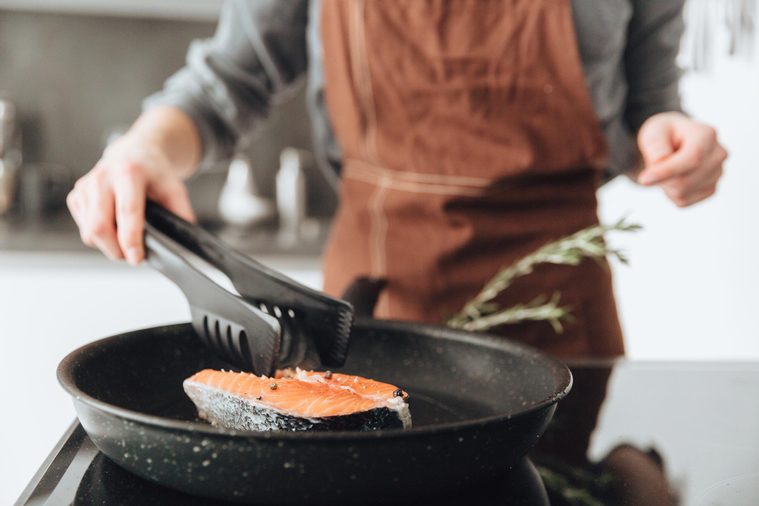
You’re not making it yours
What’s the perfect diet for your personality type? The one you will stick to. Along with genetics, consider logistical, economic, and personal preferences. For example, if you love exercising, make that a bigger part of your routine; or if you find it easy to meal plan or love to cook, focus on food. When it comes to the type of diet, no one size fits all. A recent study showed greater overall success was achieved by matching different people to different diets. All facets of weight loss are important, but you’re definitely more likely to succeed at making lifestyle changes you can actually live with. “To stick with long-term positive changes in healthy eating or exercise, it’s important to make it something that you enjoy and even look forward to,” Hultin says. “This makes change much more sustainable and enjoyable.”
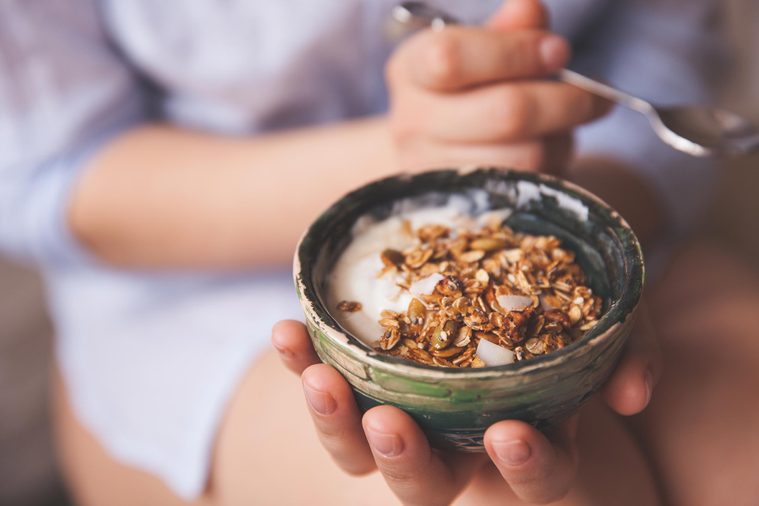
You’re not going with your gut
Your microbiome, the colony of “good” and “bad” bacteria in the digestive tract, may also affect how different people respond to foods. A recent study showed specific microbes correlated with blood sugar rises after a meal. “The evidence right now on the microbiome is still too preliminary to understand the connection between gut bacteria and weight, or how you may respond to different foods, [but] there is some interesting research on the diversity of gut bacteria and the positive ways it can be influenced by plant foods like fruits, veggies, whole grains, and beans,” Hultin says. To keep your gut healthy, eat whole foods and those with probiotics, like yogurt and sauerkraut. These are the best probiotics for weight loss.

You’re not considering other health issues
If you’re having trouble dropping pounds despite your best efforts, see your doctor to check if something else may be going on. For example, a slow thyroid (hypothyroidism) can cause weight gain; or it could be a side effect of a medication you’re taking. “Medications, thyroid labs, and other testing should be assessed by your physician if you have concerns,” Hultin says. “Stress, mental health, as well as sleep also play huge roles in body weight.” This is exactly how much sleep you need if you want to lose weight. Be sure to address all aspects of your lifestyle for optimal results. “Looking at weight loss holistically, from all angles, creates a more well-rounded and balanced program that truly impacts long-term health positively,” Hultin says. For sure, you’ll want to avoid these 50 sneaky things that can make you gain weight.

You’re not being NEAT
Going to the gym might not do much if you spend the rest of the day lying on the couch or sitting at your office desk. Non-exercise activity thermogenesis (NEAT) are the calories you’re burning when you’re not working out, just from walking around, standing, climbing stairs, doing housework, and generally being a more active person. Studies have found the amount of NEAT expended in different people can vary by 2,000 calories a day—and obese people tend to sit 2.5 hours longer per day than lean people. “No need to go to the gym for two hours if you don’t want to—research shows that getting up and moving while limiting sedentary behavior throughout the day is important,” Hultin says. Here are more ways to lose weight without a lick of “exercise.”
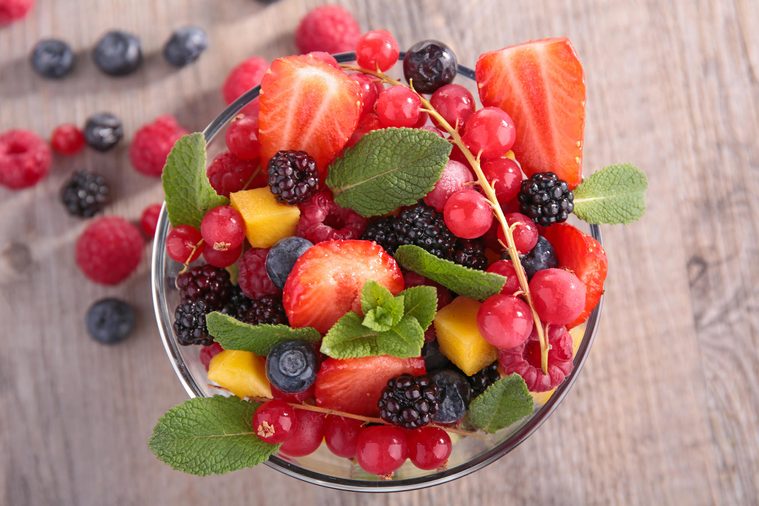
You’re eating too much “healthy” food
Certain foods, like vegetables, are less calorie-dense, which means you can eat more of them. But even if you’re eating healthily, you still have to watch portion sizes. “When you eat a food you assume is a healthy option, it tends to have a ‘health halo‘ around it; you feel as though you can eat more of it without any negative impact on health or weight,” Palinski-Wade says. “You may eat larger portions of ‘diet’ foods or splurge on other foods since you were eating only ‘healthy’ options the rest of the day. This can lead to an excessive intake of calories, which can lead to weight gain.” Plus, studies show many processed products labeled “diet” or “low-fat” can lead to weight gain, because the manufacturers make up for the loss of fat by adding more sugar or other fillers. Don’t miss these 9 foods to never, ever eat if you want to lose weight.

You don’t have a “squad”
Working out and eating healthily with friends or loved ones can provide motivation and support—and that makes a difference. In one study, 95 percent of people who embarked on a weight loss program with friends completed it, compared to 76 percent of those who went it alone. Research consistently shows people gravitate toward the health habits of those around them—in another study, the more time obese people spent with their fit friends, the more weight they lost. “Accountability and support are two main ingredients to long-term weight management success,” Palinski-Wade says. “Surrounding yourself with individuals who can help to provide encouragement and support can be a great way to increase motivation and help you stay on track.”

You’re not keeping track
You may not realize how much you’re eating—or how little you’re exercising—unless you record your habits. One study showed those participants who kept a food diary lost twice as much weight as those who didn’t. “This is mostly due to increased awareness and accountability,” Palinski-Wade says. In addition, “fitness gadgets are a great way to boost daily movement,” she says. “The awareness these provide can often help you to move more on otherwise inactive days.” Although research on fitness trackers has so far not shown much influence on weight loss, newer products offer improved features that can better help keep you on track. Don’t miss the 9 exciting things your fitness tracker knows about you.
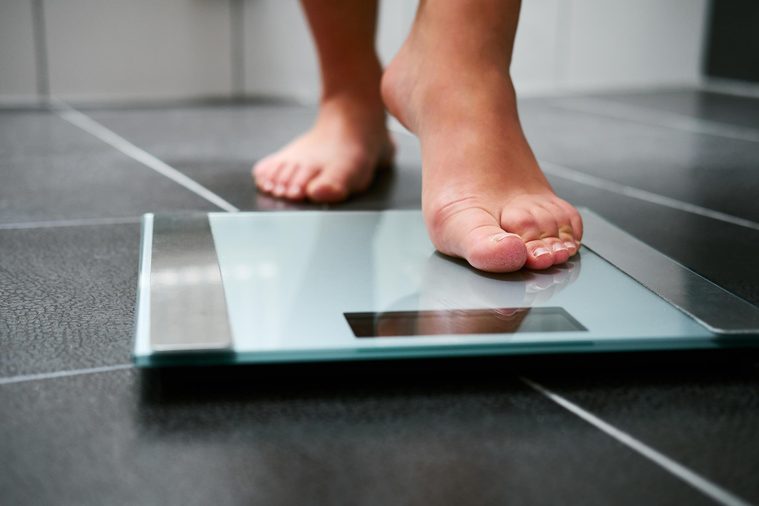
You’re a yo-yo dieter
Losing weight quickly and gaining it back repeatedly, called yo-yo dieting or weight cycling, isn’t just frustrating psychologically—research shows the back and forth confuses your body and can make it actually harder to lose weight in subsequent attempts. Plus, “crash diets that cause you to lose weight rapidly due to excessive dietary restriction can lead to a loss of both body fat and muscle mass,” Palinski-Wade says. “The more muscle you lose, the slower your metabolism, which makes it easier to gain the weight back and harder to lose it again.” Read the diet secrets of people who’ve maintained their weight loss.

You don’t have the right motivation
Although most people who hope to lose weight want to look thinner, that’s likely not a strong enough motivation to keep you going long-term—neither is guilt or caring what others think. Inner motivations like wanting to live a longer life, be more active with your kids, or achieve a goal like running a marathon or hiking a strenuous trail may help you stick to healthier habits. “Successfully improving your diet is a lifestyle change, not a quick fix,” Palinski-Wade says. “If your only objective is to hit a certain number on the scale, your motivation will wane when you are no longer attempting to lose weight.” In addition, make sure your expectations are realistic—one study showed that women who used pictures of thin models as motivation had less success losing weight. “Making small, simple changes you can stick with for life is the best way to lose weight and improve health long-term,” Palinski-Wade says. Learn more secrets of women who never “diet.”

